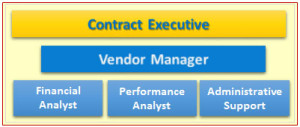By VERNA LYNCH
SVP of Business Development
June 18, 2014 | 4:00 PM ET

In TBI’s experience, many large complex organizations with multiple IT vendors find it beneficial to centralize vendor management as a function within the Program Office or as a separate entity, depending on the company’s specific organizational structure. If the current Program Office is managed by or heavily dependent on an outside vendor, considering a separate Vendor Management Organization may be appropriate.
Whatever the specific circumstances, and whether your organization formally or informally restructures or creates a Vendor Management function, a centralized model allows for more effective contract control, cost tracking, resource/asset management, and performance measurement across all vendor-related projects/programs. This is particularly true if the vendor environment is complex (many vendors, vendors crossing functional areas, few vendors with many contracts, etc.). Key roles usually represented in a centralized VM model include:
Contract Executive
The Contract Executive is a member of Senior Management who would be responsible for the executive oversight of the vendor contract(s) and is ultimately responsible for the program’s success. The Contract Executive would interact with the Vendor Manager and the vendor’s Account Executive periodically to review contract status and issues. Depending on the complexity of the business group, the Contract Executive often is responsible for all contracts within his/her functional area or for a group of contracts.
Vendor Manager
A full-time Vendor Manager, under the direction of the Contract Executive, works closely with the vendor, having day-to-day responsibility for the quality and cost effectiveness of the vendor’s services. Depending on the complexity of the particular program or contract, there may be one Vendor Manager assigned to a single contract or to a group of contracts. This is generally a full time responsibility with the following roles reporting to it:
- Financial Analyst
- Performance Analyst
- Administrative Support
Provides financial analysis and audit work in support of one or more service contracts. The Financial Analyst would identify, catalogue and monitor a contract’s financial requirements and commitments.
Monitors and analyzes vendor performance in order to assure compliance with service level agreements and continuous improvement of the service. The Performance Analyst would identify, catalogue and monitor an agreement’s performance standards, reporting requirements and any financial “penalties” for poor performance on the part of one or more vendors.
Performs Contract Administration procedures to ensure that all changes to the contract are made in accordance with the base agreement and the interests of the company, and that an audit trail is maintained. The Administrative Support person would be responsible for identifying, cataloging and monitoring requirements for reports, meetings, communications, decisions, analyses, etc. throughout the year; and maintaining a calendar of contract activities (schedule of dates for milestones, key deliverables, meetings, communications, reports, invoice delivery, etc.).
For more information about TBI’s services please contact us at TBI or call 201.573.0400.

